《大学英语读写》课程教学资源(A)Ⅱ_大学英语读写(A)Ⅱ_大学英语读写第3册_Unit3_课文 how we listen

外语教学与研究出版社 FOREIGN LANGUAGE TEACHING AND RESEARCH PRESS Real Communication 综合教程 An Integrated Course 3 NEW Standard College English 圈南京师范大学制作 外语教学与研究出版社版权所有
Real Communication An Integrated Course 制作 外语教学与研究出版社 版权所有
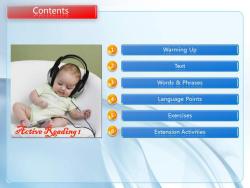
Contents 1 Warming Up Text 3 Words Phrases Language Points 5 Exercises otctive gading 1 6 Extension Activities
Contents 1 2 3 4 5 Active Reading 1 6

Warming Up Listen to the following world-famous music clips and match their composers. Beethoven Bach Tchaikovsky Johann Strauss 1.The Blue Danube 蓝色多瑙河 Johann Strauss 2.The Ode to Joy欢乐颂 Beethoven 3. Lover's Concerto爱的协奏曲 Bach 4. Air on a G String G弦之歌 Bach 5.First Piano Concerto第一钢琴协奏曲Tchaikovsky More
Listen to the following world-famous music clips and match their composers. 1. The Blue Danube 2. The Ode to Joy 3. Lover’s Concerto 4. Air on a G String 5. First Piano Concerto Warming Up Beethoven Bach Tchaikovsky Johann Strauss 蓝色多瑙河 欢乐颂 爱的协奏曲 G弦之歌 第一钢琴协奏曲 Johann Strauss Beethoven Bach Bach Tchaikovsky
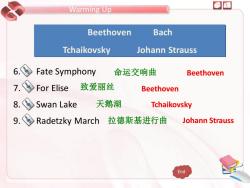
Warming Up Beethoven Bach Tchaikovsky Johann Strauss 6.Fate Symphony 命运交响曲 Beethoven 7.For Elise 致爱丽丝 Beethoven 8.Swan Lake 天鹅湖 Tchaikovsky 9.Radetzky March拉德斯基进行曲 Johann Strauss End
Warming Up Beethoven Bach Tchaikovsky Johann Strauss 6. Fate Symphony 7. For Elise 8. Swan Lake 9. Radetzky March Beethoven Beethoven Tchaikovsky Johann Strauss 命运交响曲 致爱丽丝 天鹅湖 拉德斯基进行曲

Text Art for on's soke Unlt 3 isten
Text
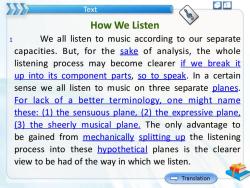
222 Text How We Listen We all listen to music according to our separate capacities.But,for the sake of analysis,the whole listening process may become clearer if we break it up into its component parts,so to speak.In a certain sense we all listen to music on three separate planes. For lack of a better terminology,one might name these:(1)the sensuous plane,(2)the expressive plane, (3)the sheerly musical plane.The only advantage to be gained from mechanically splitting up the listening process into these hypothetical planes is the clearer view to be had of the way in which we listen. Translation
How We Listen 1 We all listen to music according to our separate capacities. But, for the sake of analysis, the whole listening process may become clearer if we break it up into its component parts, so to speak. In a certain sense we all listen to music on three separate planes. For lack of a better terminology, one might name these: (1) the sensuous plane, (2) the expressive plane, (3) the sheerly musical plane. The only advantage to be gained from mechanically splitting up the listening process into these hypothetical planes is the clearer view to be had of the way in which we listen. Text
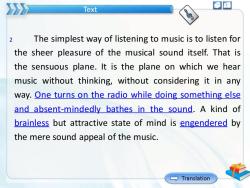
Text The simplest way of listening to music is to listen for the sheer pleasure of the musical sound itself.That is the sensuous plane.It is the plane on which we hear music without thinking,without considering it in any way.One turns on the radio while doing something else and absent-mindedly bathes in the sound.A kind of brainless but attractive state of mind is engendered by the mere sound appeal of the music. Translation
2 The simplest way of listening to music is to listen for the sheer pleasure of the musical sound itself. That is the sensuous plane. It is the plane on which we hear music without thinking, without considering it in any way. One turns on the radio while doing something else and absent-mindedly bathes in the sound. A kind of brainless but attractive state of mind is engendered by the mere sound appeal of the music. Text

Text 3 The surprising thing is that many people who consider themselves qualified music lovers abuse that plane in listening.They go to concerts in order to lose themselves.They use music as a consolation or an escape.They enter an ideal world where one doesn't have to think of the realities of everyday life.Of course they aren't thinking about the music either.Music allows them to leave it,and they go off to a place to dream,dreaming because of and apropos of the music yet never quite listening to it. Translation
3 The surprising thing is that many people who consider themselves qualified music lovers abuse that plane in listening. They go to concerts in order to lose themselves. They use music as a consolation or an escape. They enter an ideal world where one doesn't have to think of the realities of everyday life. Of course they aren't thinking about the music either. Music allows them to leave it, and they go off to a place to dream, dreaming because of and apropos of the music yet never quite listening to it. Text

Text 4 Yes,the sound appeal of music is a potent and primitive force,but you must not allow it to usurp a disproportionate share of your interest.The sensuous plane is an important one in music,a very important one,but it does not constitute the whole story. 5 The second plane on which music exists is what I have called the expressive one.Here,immediately, we tread on controversial ground.Composers have a way of shying away from any discussion of music's expressive side. nore. Translation
4 Yes, the sound appeal of music is a potent and primitive force, but you must not allow it to usurp a disproportionate share of your interest. The sensuous plane is an important one in music, a very important one, but it does not constitute the whole story. 5 The second plane on which music exists is what I have called the expressive one. Here, immediately, we tread on controversial ground. Composers have a way of shying away from any discussion of music's expressive side. Text
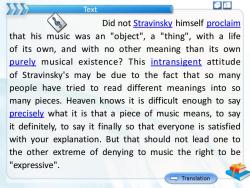
222 Text Did not Stravinsky himself proclaim that his music was an "object",a "thing",with a life of its own,and with no other meaning than its own purely musical existence?This intransigent attitude of Stravinsky's may be due to the fact that so many people have tried to read different meanings into so many pieces.Heaven knows it is difficult enough to say precisely what it is that a piece of music means,to say it definitely,to say it finally so that everyone is satisfied with your explanation.But that should not lead one to the other extreme of denying to music the right to be "expressive". Translation
Did not Stravinsky himself proclaim that his music was an "object", a "thing", with a life of its own, and with no other meaning than its own purely musical existence? This intransigent attitude of Stravinsky's may be due to the fact that so many people have tried to read different meanings into so many pieces. Heaven knows it is difficult enough to say precisely what it is that a piece of music means, to say it definitely, to say it finally so that everyone is satisfied with your explanation. But that should not lead one to the other extreme of denying to music the right to be "expressive". Text
按次数下载不扣除下载券;
注册用户24小时内重复下载只扣除一次;
顺序:VIP每日次数-->可用次数-->下载券;
- 《大学英语读写》课程教学资源(A)Ⅱ_大学英语读写(A)Ⅱ_大学英语读写第3册_Unit 1_preparation PPT.ppt
- 《大学英语读写》课程教学资源(A)Ⅱ_大学英语读写(A)Ⅱ_第三次作文参考范文.pdf
- 《大学英语读写》课程教学资源(A)Ⅱ_大学英语读写(A)Ⅱ_Unit 1_学习课件_课文讲解(译文及语言点).ppt
- 《大学英语读写》课程教学资源(A)Ⅱ_大学英语读写(A)Ⅱ_Unit 1_学习课件_课文讲解(篇章结构及长难句).ppt
- 《大学英语读写》课程教学资源(A)Ⅱ_大学英语读写(A)Ⅱ_Unit 1_学习课件_课文导入.ppt
- 《大学英语读写》课程教学资源(A)Ⅱ_大学英语读写(A)Ⅱ_Unit 1_学习课件_相关补充知识.ppt
- 《大学英语读写》课程教学资源(A)Ⅱ_大学英语读写(A)Ⅱ_Unit 1_学习课件_Active Reading 2学习课件(1).ppt
- 《大学英语读写》课程教学资源(A)Ⅱ_大学英语读写(A)Ⅱ_Unit 1 Discovering yourself 课文.doc
- 《大学英语读写》课程教学资源(A)Ⅱ_大学英语读写(A)Ⅱ_Unit 1_Unit 1 Discovering yourself Catching crabs.doc
- 《大学英语读写》课程教学资源(A)Ⅱ_大学英语读写(A)Ⅱ_Unit 1_学习课件_Active Reading 2学习课件(2).ppt
- 《翻译理论与实践》课程教学课件(PPT讲稿)英译技巧.ppt
- 《翻译理论与实践》课程教学课件(PPT讲稿)翻译概论.ppt
- 《翻译理论与实践》课程教学资源(文献资料)延伸阅读《理解与表达——汉英翻译案例讲评》.pdf
- 《翻译理论与实践》课程教学资源(文献资料)延伸阅读《Introduction to Chinese-English Translation Key Concepts and Techniques》汉英翻泽指要——核心概念与技巧.pdf
- 《大学英语读写》课程教学资源(B)Ⅱ_大学英语读写教学大纲.doc
- 《大学英语读写》课程教学资源(B)Ⅱ_四六级作文常用句型表达_四六级作文常用句型表达.doc
- 《大学英语读写》课程教学资源(B)Ⅱ_新标准第二册课件_Unit 5 Active reading 1——-Leisure Inactivity.ppt
- 《大学英语读写》课程教学资源(B)Ⅱ_大学英语读写(B)Ⅱ_课外拓展+自主学习资料_英语语音常识 2 wj-2019.ppt
- 《大学英语读写》课程教学资源(B)Ⅱ_大学英语读写(B)Ⅱ_课外拓展+自主学习资料_英语语音常识 1 wj-2019.ppt
- 《大学英语读写》课程教学资源(B)Ⅱ_大学英语读写(B)Ⅱ_课外拓展+自主学习资料_14 句子-语法-王静2020.pdf
- 《大学英语读写》课程教学资源(A)Ⅱ_大学英语读写(A)Ⅱ_大学英语读写第3册_Unit 5_preparation ppt.ppt
- 《大学英语读写》课程教学资源(A)Ⅱ_大学英语读写(A)Ⅱ_大学英语读写第3册_Unit 6_preparation ppt.ppt
- 《大学英语读写》课程教学资源(A)Ⅱ_大学英语读写(A)Ⅱ_第一单元_Unit 1 课文原文.ppt
- 《大学英语读写》课程教学资源(A)Ⅱ_大学英语读写(A)Ⅱ_第一单元_Unit 1 词汇讲解.ppt
- 《大学英语读写》课程教学资源(A)Ⅱ_大学英语读写(A)Ⅱ_第一单元_Unit 1 词汇.ppt
- 《学科英语》课程教学资源(文献资料)Academic Writing A practical guide for students Stephen Bailey.doc
- 《学科英语》课程教学资源(文献资料)预习阅读材料11.doc
- 外研教学与研究出版社:《学术英语》书籍教材PDF电子版(理工类)Academic English for Science and Engineering(扫描版).pdf
- 《学科英语》课程教学资源(讲义)0-Edited Paper_Writing direction.doc
- 《学科英语》课程教学资源(讲义)1-Introduction_hook ideas and examples.doc
- 《学科英语》课程教学资源(讲义)2-1 Emphasizing the significance of a problem_Problem Solution Essays.doc
- 《学科英语》课程教学资源(讲义)2-2 Practice_Background Paragraph.doc
- 《学科英语》课程教学资源(讲义)4-concluding paragragh_practice_Academic Writing.doc
- 《学科英语》课程教学资源(讲义)5-Citation Guide_Academic Writing.doc
- 《学科英语》课程教学资源(讲义)6-1 Basic formatting_Academic Writing.doc
- 《学科英语》课程教学资源(讲义)6-2 Basic Formatting_Text for Practice.doc
- 《学科英语》课程教学资源(讲义)通用学术英语写作讲义(下载版).doc
- 《学科英语》课程教学资源(文献资料)预习阅读材料12.doc
- 《二外(日)》课程教学课件(PPT讲稿)第11课 小野さんは 歌が好きです.ppt
- 《二外(日)》课程教学资源(PPT讲稿)标日第1-10课复习课件.ppt
